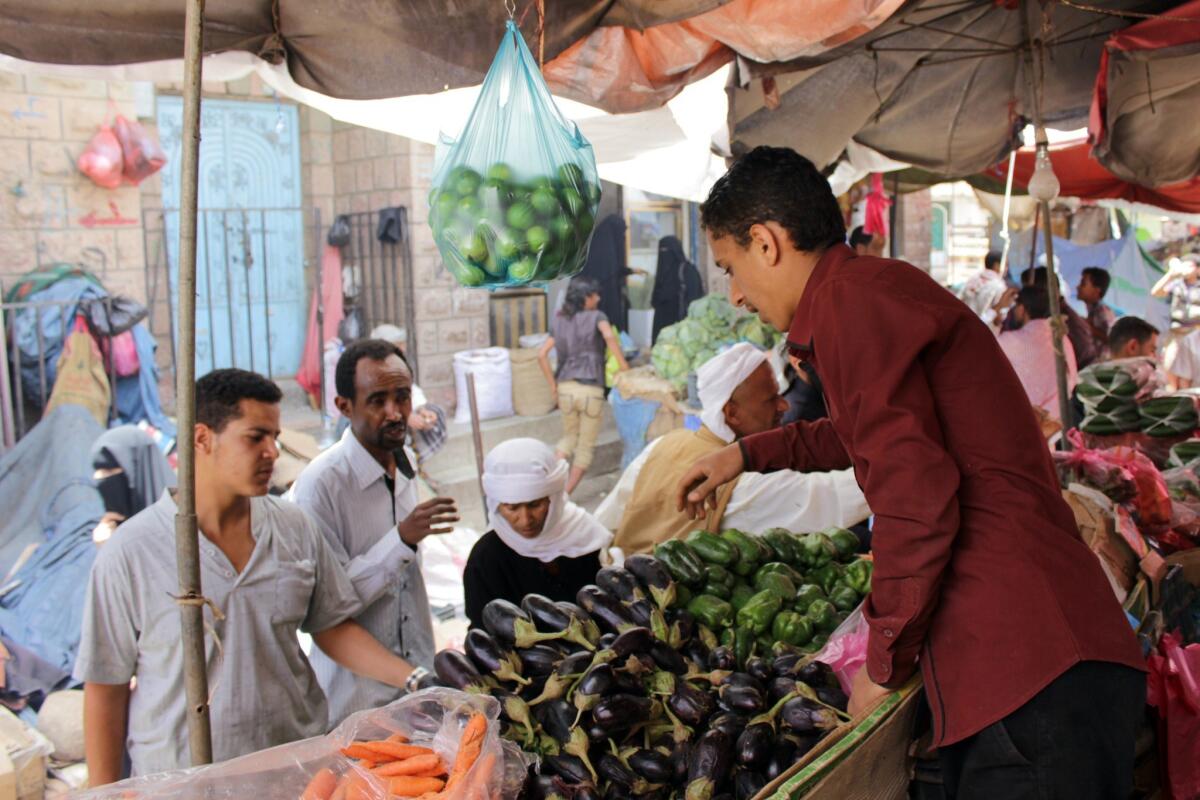Yemen’s cease-fire takes shaky hold, but both sides claim violations

Residents of the city of Taizz in southwestern Yemen take advantage of a five-day humanitarian cease-fire to buy vegetables at a market on May 13.
- Share via
Reporting from Sana, Yemen — Saudi Arabia and Yemen’s Houthi rebels traded accusations of cease-fire violations Wednesday, but a negotiated pause in their hostilities appeared to be largely holding.
Aid agencies hope to use the five-day truce that took effect at 11 p.m. Tuesday to send in food, fuel and other supplies for civilians caught in the fighting, which has killed hundreds. But they warn the break won’t be enough to reach the millions in need and avert a humanitarian disaster in the Arab world’s poorest country.
“There needs to be an immediate and permanent cease-fire by all parties, and the de facto blockade needs to be lifted to allow in much needed food and fuel,” Grace Ommer, Oxfam’s director in Yemen, said in a statement.
Residents said warplanes from a Saudi-led coalition opposed to the Houthis and their allies had bombed targets in Aden, Abyan, Shabwa and Marib.
“They announced a truce; why do airstrikes continue?” protested Daif Allah Shami, a member of the insurgents’ political office. “Not just in one place but a number of places.”
The Saudi Defense Ministry in turn accused Houthi fighters of firing projectiles over the border into the southern Saudi regions of Jizan and Najran. Houthi sniper fire was also detected, but there were no casualties, according to a report by the Saudi Press Agency.
Saudi forces were exercising “self-restraint due to their commitment to the humanitarian truce,” a unidentified defense official told the kingdom’s official news service.
There were also reports of continued clashes between pro-Houthi forces and fighters loyal to Yemen’s exiled President Abdu Rabu Mansour Hadi.
A statement issued by a pro-Hadi militia council accused the insurgents and their allies of launching an attack late Tuesday, after the cease-fire took effect, in an area northeast of Taizz, Yemen’s third-largest city.
“The Houthis have also sent supplies to their militias on the outskirts of the city, which left us with no other option but to respond back,” the council said in a statement.
Shelling was also heard around Aden, the southern port city where Hadi took refuge before fleeing to Saudi Arabia in March and the focus of much of the recent fighting.
Salma Azzam, a 29-year-old reached in Aden, said she was losing hope for a solution to the crisis.
“Life in Aden has become impossible. We can’t go out,” said Azzam, who has lived with relatives since her house was destroyed in the shelling.
Her only wish was to find somewhere else to stay, she said, “anywhere where I can sleep safely.”
Despite the reports of violence, the intensity of the fighting appeared to be markedly less than before the truce took effect.
In the capital, Sana, residents experienced their first quiet night since the Saudi-led coalition launched its air campaign on March 26 to drive back the Houthis, who have seized much of the country, and restore Hadi to power.
Warplanes were heard over Sana on Wednesday, drawing anti-aircraft fire. But no bombs were dropped on the city, residents said.
The conflict has killed more than 1,400 people -- many of them civilians -- and displaced about 300,000, according to United Nations estimates.
“There are currently 12 million people without access to sufficient food, clean water, fuel or even basic medical care,” said Ommer, of Oxfam. “Five days is not enough time to move supplies into and around the country, particularly with fuel supplies dangerously low.”
King Salman of Saudi Arabia said Wednesday that he had allocated $265 million for relief work in Yemen, nearly doubling his previous commitment.
Many officials in Saudi Arabia, a largely Sunni Muslim nation, view the Houthis as proxies of Shiite Iran, Riyadh’s major regional rival.
The Houthis, who mostly belong to a minority Shiite sect, say they have received political support from Iran but deny the alliance is a military one. They are backed by elements of Yemen’s security forces still loyal to former President Ali Abudullah Saleh, who was ousted in 2012.
Special correspondent Al-Alayaa reported from Sana and Times staff writer Zavis from Los Angeles. Special correspondent Amro Hassan in Berlin contributed to this report.
Twitter: @alexzavis
More to Read
Sign up for Essential California
The most important California stories and recommendations in your inbox every morning.
You may occasionally receive promotional content from the Los Angeles Times.










